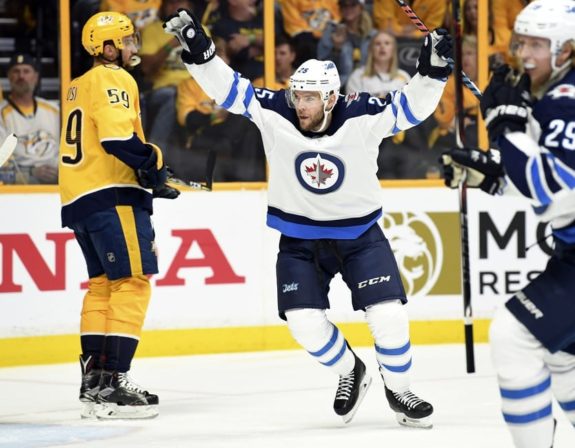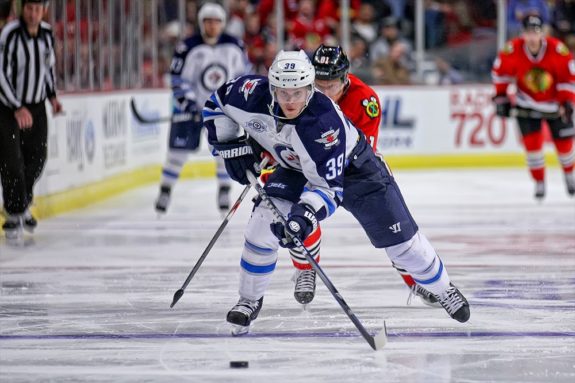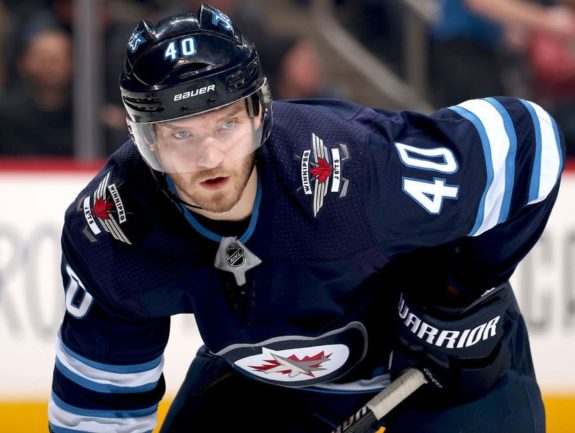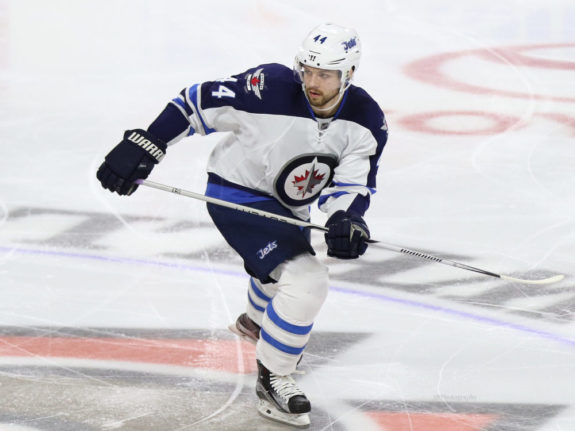The most successful season in Winnipeg Jets history came to an abrupt finish as the Cinderella story Vegas Golden Knights won the Western Conference Final in only five games.
Despite the short-lived series, the Jets impressed just about everyone around the hockey world in dominating the Minnesota Wild in Round 1 and taking care of the Presidents’ Trophy-winning Nashville Predators in what will be described as the most impactful game since their relocation, a commanding 5-1 Game 7 victory on the road in Nashville.

The season’s finale felt bittersweet because of the Jets’ youthfulness. This was their year from the beginning – the Jets looked like a contender since day one, however, this squad is far from their culmination.
To continue their progress, this will be the most important summer to date for general manager Kevin Cheveldayoff.
“I think these players know they’re a big part of it individually and collectively. We’ll get at the business side of it relatively quickly here,” said Cheveldayoff. “The summer side of things is well underway. […] For me, my hope is that next year we won’t have to have exit meetings.”
Past achievements like a second-place finish in the regular season mean nothing now. While these experiences should be lessons learned, next year will be a fresh slate with bolstered expectations.
The first task on Cheveldayoff’s to-do list is the 2018 NHL Entry Draft. The team will be without their first-round pick for the first time in their history, which includes nine first-round selections in the past seven drafts.
With the exception of a trade, the Jets will debut on stage at the American Airlines Centre in Dallas, Texas at the 60th overall selection.
The next item to cross off is taking care of their unrestricted and restricted free agents.
It is unlikely the Jets will bring back any of their notable unrestricted free agents which include Toby Enstrom, Matt Hendricks, Michael Hutchinson, Shawn Matthias and Paul Stastny, who Cheveldayoff would like to extend but could certainly make more money on the open market.

For restricted free agents, Jets’ management will not have it so easy. Several pieces of their core group need new contracts and many will receive lucrative long-term deals.
“We’ll do our best to sharpen our pencils and do as good of work as we can on the business side of it to make sure everybody feels like they’re apart of it on the fairness of a contract and also build within the constraints,” said Cheveldayoff at the season-ending press conference.
Cheveldayoff has approximately $25 million to be creative with from the expiring contracts and salary cap increase, that according to Elliotte Friedman, is rumoured to hover around $80 million.
Joel Armia
Joel Armia is an extremely useful player for head coach Paul Maurice. His active stick and ability to eat up minutes on the special teams provide a necessary boost in the lineup.
The Pori, Finland product made his way to friendly Manitoba along with Tyler Myers, Brendan Lemieux, Drew Stafford, and the pick that was used to select Jack Roslovic in a trade that sent Evander Kane, Zach Bogosian and goaltender Jason Kasdorf to the Buffalo Sabres.
The Jets have already won that trade by a landslide but how important is Armia, a 2011 16th-overall pick, to this club?
His total time on ice per game (TOI/GP) ranked 12th among Jets forwards averaging 12:36 a night, which would indicate he is the least-used forward of their group, but the Paul Stastny trade lent itself to his lack of ice time.
The 6-foot-3 power forward, however, ranked eighth among Jets’ forwards in points while contributing 1:08 shorthanded time on ice per game (SH TOI/GP) and 1:30 powerplay ice time per game (PP TOI/GP).
Only Bryan Little, Mark Scheifele, and Blake Wheeler averaged 1:00 or more per game on both sides of the special team efforts.

The 25-year-old has seen his production over the course of his three NHL seasons go from 10 points to 19 to 29. If he can continue to improve at that rate and add an additional 10 points like he has been doing each season, he could be a possible 40-point player.
Armia, who has amassed 58 points in 180 career games, is one of those essential players teams need because of his affordability and usage.
Comparable contracts could include New York Rangers’ Jesper Fast, who received a three-year contract averaging $1.85 million per season after 65 points in his first 216 career games or San Jose Sharks’ Melker Karlsson, who earned a three-year deal averaging $2 million annually after posting 65 points in his first 185 games.
Connor Hellebuyck
After two strong seasons in the American Hockey League, Connor Hellebuyck made the jump to The Show, making the transition across the hall from the Manitoba Moose dressing room to the Jets.
Looking back to his 2016-17 rookie season, Hellebuyck was making headlines for several reasons, few and far between being described as flattering. Despite the negativity Hellebuyck endured during his freshman campaign, he kept his eyes on the prize and looked forward for better things ahead. Improvement should have been expected from a rookie goaltender going into his second season but also a wariness of the infamous “sophomore slump” that so many second-year players experience.
The metamorphosis that fans and media alike witnessed was far from conventional. The transformation from an up-and-comer to an elite goaltender was remarkable. The 6-foot-4, positionally sound goaltender’s bounce-back season included a Vezina Trophy nomination and an all-time record for wins by an American goaltender with 44, with an additional nine victories in the postseason.
If one were to ask Hellebuyck, nine playoff wins are far from where he expected to finish by the end of the Stanley Cup Playoffs, but much like his bounce-back campaign, it is all about the big picture.
“We’re talking about being a dynasty and really making pushes every single year,” said Hellebuyck. “We have to go through a couple hardships. We’re going to learn from this [playoff experience] and get better from it.”
If an American team were to be assembled, whether it be an Olympic roster or for the World Cup of Hockey, Hellebuyck could very well find himself as one of their three selections.
Given the calibre of American-born goalies featuring the likes of Jonathan Quick, Ben Bishop, Cory Schneider, and John Gibson, it is a true testament to the skill level Hellebuyck possesses.
The 25-year-old, Michigan native makes his teammates want to play for him, something that is desired and valued more than anything in a team sport like hockey. His calm, cool and collected demeanour reminds one of Carey Price or Braden Holtby. He rarely finds himself on a highlight reel because he is never out of position enough to make a sensational save worthy enough to merit consideration.
Hellebuyck has 166 games under his belt with a 92-48-15 record over that time including 14 shutouts. His career average save percentage (Sv%) is .917 and a goals-against average (GAA) of 2.53. A comparable contract for Hellebuyck could be Holtby. After Holtby’s first 178 games with the Washington Capitals, they rewarded him with a five-year extension worth an average of $6.1 million a season.
“I love the city, I love playing here and I love the fan base. Nothing would make me more happy than signing long-term,” said Hellebuyck.
Jets fans can only hope Hellebuyck finds himself in the same situation as Holtby next year – playing for the ultimate prize.
Adam Lowry
When the Jets made their first selection in 2011, they decided on Scheifele as the centre that would lead their team in the future.
Their second selection was not as sexy nor as prominent of a player, but instead, someone who they felt was a sure-fire NHLer, whether that be in an offensive role or gritty bottom-six option. This was their 67th overall pick – Swift Current Broncos’ captain Adam Lowry.

Since his arrival to Winnipeg, Lowry has been in the process of being groomed as a shutdown centerman, a role he played to a tee in the playoffs for the Jets.
Every team needs a Lowry-type player. A bottom-six centre who matches up against their opponents’ best and sticks to them like glue. A role similar to Jarret Stoll for the Los Angeles Kings in their 2012 and 2014 Stanley Cup victories.
On a larger scale, one could look to how Joel Otto played for the Calgary Flames in their 1989 championship season.
Lowry’s offence is coming a tad slower than expected, with 90 points in 281 career games so far. However, he was on track for 38 points if his pace through 45 games was maintained in a healthy 82-game season, which would have been a career-high.
The 25-year-old led all forwards on the Jets’ ninth overall ranked penalty kill in SH TOI/GP averaging 2:02 and ranked seventh overall among all forwards in TOI/G averaging 14:54 per game. The 6-foot-5 centerman’s NHL pedigree is off the charts as his father, Dave Lowry, suited up in over 1000 games and has an extensive coaching background including five seasons as head coach of the Victoria Royals.
“Dave is a coach who preaches accountability. He makes his expectations crystal clear and really knows how to get the most out of each of his players,” said Matthew Phillips, who played two seasons under Lowry in Victoria.
Now an assistant coach on the Kings’ staff, Dave offered a piece of advice to Adam regarding the Stanley Cup Playoffs.
“Just enjoy it,” said the NHL veteran of five different clubs. This is an extremely hard trophy to lift. So when you have an opportunity to win in the league, try to take advantage of it.”
A similar player would be New York Islanders’ centre Casey Cizikas, who signed a five-year extension in 2016 worth $3.35 million per season. This is the kind of deal one should expect Lowry to re-sign for which would be considered an investment of sorts.
Josh Morrissey
One of the most fascinating contracts to evaluate is that of Josh Morrissey.
Already one of the Jets’ best defenders, the former Prince Albert Raider and Kelowna Rocket has a ton of room left to grow. He averages the fourth-most ice-time per game among Jets’ defencemen playing 20:27, including an average of 2:25 SH TOI/GP, where he excels due to his properly positioned stick and ability to get into shot lanes. The Calgary product finished the regular season with 168 blocked shots, leading his team and finishing at 12th overall league-wide.
“Obviously blocking shots and getting in the tough areas is part of playoff hockey. Everybody’s sacrificing out there to try to do everything they can to help the team win,” said Morrissey modestly, a virtue unfamiliar to The Smiths lead singer who shares his name.
With offensive-minded players like Dustin Byfuglien and Jacob Trouba manning the right side, Morrissey creates a perfect balance as a shutdown option to pair with either and the potential to improve his production yet.

The 2013 13th-overall pick has a legitimate chance to find himself on the blueline of the next Canadian Olympic team in 2022 if the NHL players are permitted to attend.
Two defencemen with the Edmonton Oilers, Oscar Klefbom and Adam Larsson, have almost identical contracts which are similar to the one we could expect the 6-foot, 24-year-old Morrissey to sign.
Klefbom signed a seven-year deal worth $4.17 million annually while Larsson signed for the same amount over a six-year term while he was still a member of the New Jersey Devils.
Florida Panthers defender Michael Matheson may also be a fine comparable, as he was inked to an eight-year contract worth $4.875 million per season. If the Jets wanted to save some money long-term, this may be the best route to follow.
“I love being a Winnipeg Jet but all those things get taken care of in the offseason,” said Morrissey. “Right now, it’s just so soon after the year. Obviously, still really disappointed with the way things ended. All those things get sorted out over the summer.”
Jacob Trouba
Trouba is best known around the league as a puck-moving, smooth skating defender that specializes in breaking the cycle effectively and transitioning the puck up ice. Something else he is known for is the drama surrounding his previous contract that resulted in his absence at training camp and a trade request out of the Manitoba capital.
These headlines put a sour taste in the mouths of many fans and likely teammates as well, but putting his issues aside and signing a two-year bridge deal was the best case for both parties involved. The University of Michigan alumni wanted more ice-time and a spot on the right side in the top-four and the Jets’ simply wanted him to earn it.
After two seasons of productive hockey and visible improvements in both ends of the rink, Trouba isn’t so opposed to signing back long-term with Winnipeg.
#NHLJets who expressed their desire to play in Winnipeg long-term:
– Patrik Laine
– Josh Morrissey
– Jacob Trouba
– Connor Hellebuyck— Scott Billeck (@ScottBilleck) May 22, 2018
“You get the sense there’s a little unfinished business here with this team. We all have such good relationships – it’s fun to be a part of,” said Trouba. “It’s a special team and you want to play for a contender and that’s what we have here.
Besides his evident growth both physically and mentally, what else swayed his decision?
“Well now I get to play with Josh [Morrissey],” said Trouba with a cheeky smile. “I feel like we play very well together. We have an important role. It’s a role that is challenging every night that we have grown and learned with.”
Despite his reply attempting to dodge any speculation that there will be troublesome contract negotiations again, he has a point. He and Morrissey have the opportunity to not only grow as a pair and become the go-to guys for the Jets but perhaps among the best pairings in the entire league.
Islanders’ defenceman Nick Leddy signing a seven-year deal worth $5.5 million per season at 23-years-old is a very friendly deal for both ends. Trouba may end up closer to $5 million due to the inability he has shown to escape a grueling 82-game schedule without injury.
The Rest of the Bunch
Brandon Tanev provided the Jets’ with a feisty forecheck and performed admirably in the playoffs. One should expect him to sign a deal that mirrors that of Andrew Copp’s – a two-year deal worth $1 million annually.
Joe Morrow showed he was more than just a depth defenceman for the Jets and as the expression goes, you can never have too many defenders. Players like Morrow typically make right around $1 million as well, which is a very affordable price for a sixth or seventh defender.
Marko Dano is almost surely not returning as he only saw the ice 23 times this season, mostly serving as a healthy scratch.
Nic Petan is still a solid prospect, however, he seems to have been replaced with the likes of Roslovic, Kyle Connor and even Tanev. He may be dangled as trade bait to acquire an additional draft pick or depth player.
Squeezing these restricted free agents under the salary cap is no easy feat, but Cheveldayoff has shown us nothing to believe that it will be impossible, and all signs point to a very productive offseason.